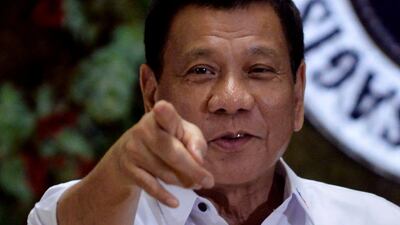The Philippines has given official notice to the United Nations that it will exit the treaty underpinning the International Criminal Court, which is looking into President Rodrigo Duterte's deadly drug war.
The move on Friday comes days after Mr Duterte said his nation would quit the court over its inquiry launched last month into allegations his bloody crackdown on drugs amounted to crimes against humanity.
Philippine police say they have killed roughly 4,000 suspects who fought back during arrest, but rights groups allege the actual number is three times higher and accuse the authorities of murder.
On Thursday the Philippines said in a letter to the UN, which oversaw negotiations to found the court, that it was pulling out of the Rome Statute.
"The decision to withdraw is the Philippines' principled stand against those who would politicise and weaponise human rights," the letter said.
Foreign Secretary Alan Peter Cayetano, speaking from Manila, said the Philippines was quitting due to "the well-orchestrated campaign to mislead the international community, to crucify President Duterte ... by distorting the human rights situation in the country".
_______________
Read more:
Philippines open to UN drugs war probe, if by 'credible, objective' investigator
Dying among the dead: Philippines' poorest easy prey in Duterte's drugs war
_______________
Officially quitting the court requires a year's notice and experts say pulling out does not preclude an investigation of the killings, which have drawn international concern.
"A withdrawal would have no impact on ongoing proceedings or any matter which was already under consideration by the court prior to the date on which the withdrawal became effective," the ICC said on Friday, its first comment since Mr Duterte's announcement.
"The court encourages the Philippines to not follow through with the reported/stated intention to withdraw, as it is ... an integral part of the international criminal justice system," it added.
Should the Philippines fully withdraw from the court it would not be the first to do so, as Burundi became the first nation to leave in October 2017.
The Philippines said in its letter that it "affirms its commitment to fight against impunity for atrocity crimes", despite its withdrawal.
Opened in 2002, the ICC is the world's only permanent war crimes court and aims to prosecute the worst abuses when national courts are unable or unwilling.
The Philippines, under previous president Benigno Aquino, ratified in 2011 the Rome Statute which underpins the ICC, giving the tribunal authority to investigate crimes on its soil.
Mr Duterte, who is buoyed by high popularity ratings at home, has defended the drug war as a battle to bring safety to his nation's 100 million people.
He has frequently urged authorities to kill drug suspects while promising to protect police from legal sanction.

